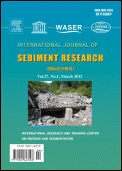
International Journal of Sediment Research
Scope & Guideline
Elevating Understanding of Earth's Sedimentary Systems
Introduction
Aims and Scopes
- Sediment Transport Dynamics:
The journal emphasizes research on the mechanisms of sediment transport, including both fluvial and marine environments. Studies often involve numerical modeling, field experiments, and laboratory investigations to explore how sediment is mobilized, transported, and deposited. - Geochemical and Mineralogical Analysis:
There is a strong focus on the geochemical properties of sediments, including the study of contaminants, nutrients, and organic matter. Research often employs advanced analytical techniques to understand the sources, fate, and ecological impacts of sediment constituents. - Erosion and Sediment Control:
The journal covers methodologies and technologies for managing sediment erosion and deposition, with applications in agricultural, urban, and natural landscapes. This includes studies on the effectiveness of vegetation, check dams, and other engineering solutions. - Hydrological and Hydrodynamic Interactions:
Research often investigates the interplay between hydrological processes and sediment dynamics, focusing on how water flow influences sediment transport and deposition patterns in various settings. - Environmental and Ecological Impacts:
The journal addresses the ecological implications of sediment transport and deposition, including effects on aquatic habitats, water quality, and biogeochemical cycles.
Trending and Emerging
- Climate Change Impacts on Sediment Dynamics:
There is an increasing focus on how climate change affects sediment transport and deposition, particularly in riverine and coastal environments. This research is critical for understanding future changes in sediment budgets and associated ecological impacts. - Use of Advanced Modeling Techniques:
Emerging themes include the application of artificial intelligence and machine learning models for predicting sediment transport and erosion processes. These advanced methodologies are gaining traction due to their potential for improving accuracy and efficiency in sediment research. - Sustainable Sediment Management Practices:
Research is increasingly addressing sustainable practices for managing sediment in various contexts, including urban development, agriculture, and ecosystem restoration. This trend reflects a growing awareness of the need for environmentally responsible sediment management. - Sediment-Water Interactions:
There is a rising interest in understanding the interactions between sediments and water quality, particularly in terms of nutrient cycling and contamination. This theme is significant for addressing issues related to eutrophication and pollution in aquatic systems. - Innovative Techniques for Sediment Characterization:
The journal is seeing a trend toward the development and application of novel techniques for sediment characterization, such as high-resolution imaging and geochemical profiling, which enhance our understanding of sediment properties and behaviors.
Declining or Waning
- Sediment Quality Assessment:
There seems to be a decrease in studies focused solely on sediment quality assessment without a broader context of sediment dynamics or ecological implications. This may be due to a growing emphasis on integrated approaches that combine sediment quality with hydrological and ecological studies. - Historical Sediment Studies:
Research focusing on historical sediment transport processes and paleoenvironments appears to be less frequent. This could indicate a shift toward contemporary sediment dynamics and immediate environmental impacts rather than historical analysis. - Basic Laboratory Experiments:
There is a noticeable reduction in the publication of basic laboratory experiments that do not connect to field applications or broader environmental implications. As the field advances, there is a preference for studies that integrate laboratory findings with real-world scenarios.
Similar Journals
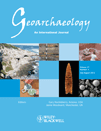
GEOARCHAEOLOGY-AN INTERNATIONAL JOURNAL
Innovating Archaeological Understanding Through GeoscienceGEOARCHAEOLOGY-AN INTERNATIONAL JOURNAL is a leading peer-reviewed publication dedicated to the interdisciplinary study of the interactions between geology and archaeology. Published by Wiley in the United States, this esteemed journal serves as a vital platform for researchers and professionals in the fields of archaeology, earth sciences, and environmental studies. With an impressive impact factor and categorized in the Q1 quartile of subjects such as Archaeology and Earth and Planetary Sciences, it ranks among the top journals in its discipline, reflecting its significant contribution to academic discourse and research innovations. Since its inception in 1986 and projected to continue into 2024, GEOARCHAEOLOGY emphasizes the importance of integrating geological methods within archaeological research, fostering a deeper understanding of human history in relation to the earth’s processes. This journal is an indispensable resource for scholars and students alike who seek to explore the dynamic connections between past human behavior and the geological record.
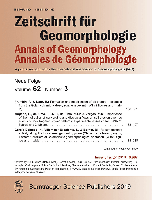
ZEITSCHRIFT FUR GEOMORPHOLOGIE
Decoding the Earth's Surface: A Geomorphological Journey.ZEITSCHRIFT FUR GEOMORPHOLOGIE is a prestigious journal dedicated to the field of geomorphology, published by GEBRUDER BORNTRAEGER from Germany. With the ISSN 0372-8854 and E-ISSN 1864-1687, this journal serves as a vital platform for researchers, professionals, and students interested in understanding the dynamic processes that shape our Earth’s surface. The journal has consistently maintained a solid academic reputation, achieving a Q3 ranking in key categories including Earth and Planetary Sciences (miscellaneous), Earth-Surface Processes, and Geography, Planning and Development as of 2023. This reflects its position within the global scientific community; ranked at #93 out of 179 in Earth-Surface Processes, contributing to crucial discussions surrounding environmental changes and landform evolution. Although ZEITSCHRIFT FUR GEOMORPHOLOGIE is not an Open Access publication, it offers extensive insights and findings from converged years spanning from 1979 to 2019 and again from 2021 to 2022. The journal is located at Johannesstr 3A, D-70176 Stuttgart, Germany, and plays a pivotal role in advancing geomorphological research that impacts natural sciences, ecology, and planning strategies worldwide.
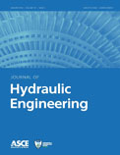
JOURNAL OF HYDRAULIC ENGINEERING
Transforming challenges into solutions in hydraulic engineering.Journal of Hydraulic Engineering, published by ASCE - American Society of Civil Engineers, stands as a premier platform for the dissemination of innovative research in the realms of hydraulic and water resources engineering. With an ISSN of 0733-9429 and an E-ISSN of 1943-7900, this esteemed journal has been a vital resource since its inception in 1980, serving an ever-growing audience keen on advancements in hydraulic engineering practices, technologies, and applications. It is currently ranked in the Q2 category for Civil and Structural Engineering, Mechanical Engineering, and Water Science and Technology as of 2023, reflecting its significant impact and contribution to these essential fields. Researchers can access its in-depth articles focused on theoretical, experimental, and practical topics while benefiting from a robust peer-review process that ensures high-quality publications. As the challenges related to water resources and hydraulic systems increasingly gain importance globally, the Journal of Hydraulic Engineering continues to play a crucial role in shaping knowledge and innovations that address these pressing issues.

Journal of Sedimentary Environments
Unveiling the Secrets of Sedimentary Environments.Journal of Sedimentary Environments is a leading open-access publication dedicated to advancing the study of sedimentary processes and environments. Published by SPRINGER HEIDELBERG, this journal embraces a wide array of topics including sedimentology, paleoenvironments, and the interactions between sediments and ecosystems. Since its transition to open access in 2016, it has prioritized making high-quality research widely available, fostering collaboration and innovation among researchers, professionals, and students in the field. With a commitment to excellence, the journal aims to publish groundbreaking studies that enhance our understanding of sedimentary environments, making it an essential resource for anyone interested in the dynamics of Earth’s sedimentary systems. Located in Heidelberg, Germany, this journal is poised to play a vital role in shaping current and future research discussions worldwide.
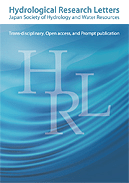
Hydrological Research Letters
Advancing Hydrology: Your Gateway to Innovative ResearchHydrological Research Letters (ISSN: 1882-3416) is a distinguished peer-reviewed journal published by JSHWR, JAGH, JAHS, JSPH in Japan. Established with open access since 2007, this journal serves as a critical platform for the dissemination of innovative research in the field of hydrology, water science, and technology. With an increasing impact factor, currently positioned in the Q3 quartile for both Earth and Planetary Sciences and Water Science and Technology, it attracts a diverse readership keen to stay abreast of groundbreaking findings that shape water management and environmental policy. Researchers, professionals, and students alike will find this publication an invaluable resource for enhancing their understanding of hydrological processes and their implications. The journal is committed to fostering open academic dialogue and encouraging high-quality contributions during its converging years from 2015 to 2024. For more information, authors and readers can access the journal at its address, C/O INT ACAD PRINTING CO, LTD, Shinjuku-ku, Tokyo, Japan.
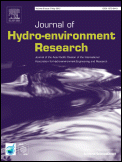
Journal of Hydro-environment Research
Advancing sustainable solutions for water and the environment.The Journal of Hydro-environment Research, published by Elsevier, serves as a leading platform for advancing knowledge in the fields of civil and structural engineering, environmental chemistry, and water science. With a robust impact factor reflecting its Q2 category ranking across various disciplines—including Environmental Engineering and Management, Monitoring, Policy and Law—it emphasizes high-quality research that addresses pressing environmental challenges. Embracing a global perspective, the journal explores interdisciplinary approaches to water and environmental management, thus empowering researchers and professionals to innovate and implement effective solutions. Since its inception in 2007, the journal has continually evolved, with its scope expanding into emerging areas pertinent to water science and technology. The journal is indexed in esteemed databases, ensuring wide dissemination and accessibility of published works, although it does not currently operate on an open access model. Addressing the intricate interplay between human activities and water resources, the Journal of Hydro-environment Research is quintessential for those dedicated to fostering sustainable practices and enhancing our understanding of hydro-environmental systems.

SEDIMENTOLOGY
Elevating the discourse in sedimentology research.SEDIMENTOLOGY (ISSN: 0037-0746, E-ISSN: 1365-3091) is a premier journal published by Wiley in the United Kingdom, dedicated to advancing the scientific understanding of sedimentary processes, depositional environments, and the broader implications for stratigraphy and geology. With an impressive impact factor that places it in the prestigious Q1 category within both geology and stratigraphy, SEDIMENTOLOGY ranks among the top journals in its field, with Scopus rankings of #3 in Stratigraphy and #20 in Geology, reflecting its significant influence and the high-quality research it publishes. This journal, which conceives high-impact research contributions from 1962 to 2024, serves as an essential resource for researchers, professionals, and students alike, fostering a deeper exploration of sedimentary systems and providing a forum for the dissemination of novel findings. Although not open access, articles published in SEDIMENTOLOGY are critical for enhancing our understanding of sedimentation dynamics, which have far-reaching implications for natural resource management and environmental assessments.

Water Waves
Innovating Research in Water Wave AnalysisWater Waves is a leading academic journal dedicated to advancing research in the fields of analysis, applied mathematics, computational mathematics, and modeling and simulation. Published by SPRINGERNATURE, the journal has positioned itself as a vital resource for researchers and professionals who are exploring the dynamic behaviors of water waves and their applications across various scientific disciplines. With an ISSN of 2523-367X and an E-ISSN of 2523-3688, the journal provides a robust platform for disseminating high-quality research findings, featuring works that reflect innovative methodologies and significant contributions to the understanding of water dynamics. With its publication corridor extending from 2019 to 2024 and achieving a commendable Q2 quartile ranking in multiple mathematics categories for 2023, "Water Waves" emphasizes its commitment to fostering scholarly excellence. Despite its evolving status, the journal remains accessible to a wide audience, underscoring its significance in shaping the discourse in its respective fields, while also providing vital insights and fostering collaboration among researchers, academicians, and students alike.
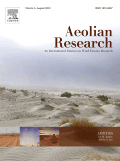
Aeolian Research
Charting New Terrains in Aeolian ResearchAeolian Research, published by ELSEVIER SCI LTD, is a leading academic journal in the fields of Earth-Surface Processes and Geology, holding a prestigious Q1 category ranking in both disciplines as of 2023. With an ISSN of 1875-9637 and an E-ISSN of 2212-1684, this journal is pivotal for researchers and scholars interested in the intricate dynamics of aeolian processes and their implications for geology and environmental science. Covering a span of research from 2009 to 2024, it regularly disseminates high-impact studies that explore the interactions between wind-driven processes and sediment transport, erosion, and landscape evolution. With a Scopus ranking of #34 and #20 in their respective categories, Aeolian Research serves as an essential resource for advancing knowledge in Earth and Planetary Sciences. While currently not an open-access journal, it delivers compelling insights that are relevant to contemporary challenges in geology and environmental management.

BASIN RESEARCH
Illuminating the Path of Earth and Planetary SciencesBasin Research, published by Wiley, is a leading journal in the field of Geology, with a distinguished reputation affirmed by its Q1 ranking in the 2023 category of Earth and Planetary Sciences. Since its inception in 1988, the journal has been at the forefront of fundamental and applied research surrounding sedimentary basins, delving into their evolution, architecture, and dynamics. With an impressive Scopus rank of #36 out of 321, placing it in the 88th percentile, Basin Research serves as a critical platform for researchers, professionals, and students engaged in advancing our understanding of geological processes and their implications for natural resources and environmental policies. The journal is accessible to a global audience and emphasizes high-quality, peer-reviewed articles that cover a diverse array of topics from basin analysis to sedimentology and beyond. For those interested in deepening their insights into this vital area of study, Basin Research stands as an invaluable resource in the academic landscape.